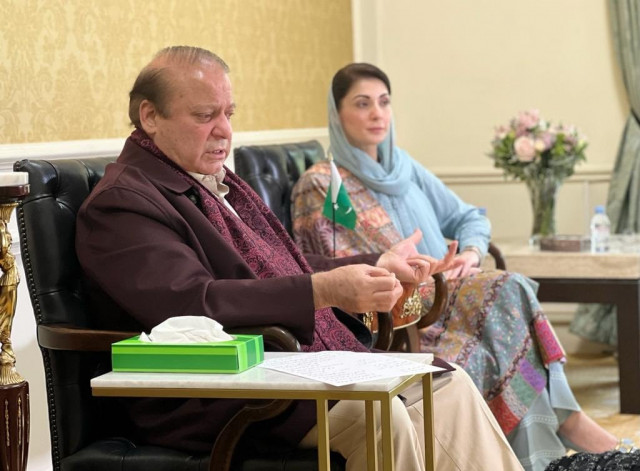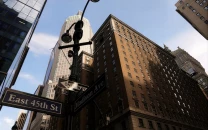Maryam’s exoneration paves way for Nawaz’s acquittal
IHC finds no link of ex-premier buying Avenfield flats through assets beyond means

PML-N supremo and former premier Nawaz Sharif is all set to be acquitted in the National Accountability Bureau (NAB)’s Avenfield apartments reference as the Islamabad High Court judgment ruled that the anti-graft body had not only failed to prove its charges against him and others, but its investigation was “disappointing”.
Four years after being convicted, the IHC’s detailed judgment, issued on Thursday, exonerated the former premier’s daughter, PML-N Vice President Maryam Nawaz, and her husband Capt (retd) Safdar in the London flats case.
It found no evidence linking the ex-premier with acquiring the properties through assets beyond means.
NAB also failed to prove that Nawaz’s daughter and son-in-law were the beneficiaries of the assets or helped him in concealing them.
The detailed judgment on the appeals of Maryam and her husband in the Avenfield reference, IHC’s Justice Aamer Farooq and Justice Mohsin Akhtar Kayani ruled that not a single document existed that supported the prosecution’s stance or proved the charges against the accused.
The court noted that the prosecution had to prove that when the properties were acquired by Nawaz in the name of his dependents through Nescoll Ltd and Nielsen Enterprises Ltd, he was a public office holder. “There does not exist on record any evidence to the effect,” the judgment read.
The judges stated that the accountability court’s judgment awarding 10 years imprisonment to Nawaz, seven years to Maryam and one year to Safdar in the Avenfield case “is based on wrong application of the law”.
The IHC noted that the accountability court’s judgment showed that it copiously reproduced NAB’s arguments and “erred in application of the correct law”.
The trial court held the letters from a Panama-based law firm to be the proof of the fact that Maryam was the beneficial owner of the Avenfield apartments, the IHC noted.
The IHC added that “the conclusion drawn is not correct” as the letters were not from the foreign government but the Panama-based law firm.
“Even otherwise if the letters are accepted as correct in letter and spirit, they do not further the case of the prosecution as the element of Maryam being dependent on her father was not proved,” the verdict read.
The court emphasised that questions regarding key documents in the case and linking them to Nawaz as well as Maryam were initially asked in November, 2021, and on multiple dates were repeated but NAB was unable to assist the bench on the issue even till the last date of hearing.
Recalling that the accountability court had turned down the allegation of corrupt and illegal practices (Section 9(a)(iv) of NAB Ordinance) against Nawaz and no appeal was filed against it, the IHC observed that the sole charge left against the former premier was of ‘assets beyond mean’.
On this behalf, the assets of the companies, including the Avenfield apartments, were attributed to Nawaz. According to the prosecution, they were in the name of his dependent child Maryam.
“There is no direct or indirect proof that appellant No.1 [Maryam Nawaz] was the dependent of Mian Muhammad Nawaz Sharif at the relevant time and the prosecution failed to establish the elements/ingredients of Section 9(a)(v) … which are required for transfer of burden of proof to the accused under Section 14(c) of the Ordinance,” the judgment stated.
The judges noted that the “burden never shifted on her to establish ownership rather, all along, it remained on the prosecution”.
The prosecution could not prove the element of aiding and abetting the principal offender, on part of Maryam, the IHC ruled.
“In brief, [the] prosecution has failed to prove beyond reasonable doubt that Maryam was [the] beneficial owner of [the] Avenfield [flats],” it read.
Safdar has solely been convicted for evidencing a forged and bogus document, however, there is no evidence that any party has denied the execution.
“The prosecution had to discharge its burden independently in respect of findings of the august apex court and it did not,” the judgment stated.
The NAB prosecutor also sought to argue that the benefit of the amendments made to the accountability law was not available to the appellants.
In response, the counsel for the appellants refuted by stating that his clients were not seeking benefits of amendments made to the ordinance.
“The charge against Maryam is of aiding and abetting by way of concealing true identity of the owners of the Avenfield apartments, the court noted, adding that under Section 14(c) of the NAB Ordinance, where prosecution establishes assets beyond means of the principal accused or his benamidar or dependent of the accused, the onus shifts on the accused to negate the allegations.
The judges noted that the prosecution had to prove the nexus of the Sharif family either Nawaz or Maryam or her two brothers, Hassan and Hussain, arrayed as accused with Neilson and Nescoll companies.
They added that it was an admitted position and not denied by any party that Avenfield apartments were purchased in the name of these companies.
“However, nothing on record exists to establish that when the properties were purchased, the beneficial ownership of the companies vested with the Sharif family," it noted.
The verdict read that NAB had categorically stated that the Sharif family had a nexus with Avenfield apartments since 1993-96 but when it was specifically inquired from NAB’s special prosecutor to establish this, “he was unable to do so, as no document exists to the effect”.
“It is an established principle that even if an accused admits to a charge,” the judgment read, “the prosecution is not absolved from proving the same.” It added that the “Supreme Court held that where the prosecution failed to prove its case the accused ought to be acquitted even where he has admitted guilt”.
Stating that ambiguity lurked in the evidence and no role of any accused person was specified, the IHC noted that no independent allegation against Maryam could have been levelled under Section 9(a)(v) of the Ordinance as she was never and still not a public office holder so, she could not have committed the crime of ‘assets beyond means’ per se.
“Her father Nawaz Sharif has remained a ‘public office holder’ in various capacities and even when, Panama Papers were leaked, he was the prime minister of the country. The principal accused, in all regards, is Nawaz Sharif as per allegations of the prosecution, therefore, evidence which was to be led by the prosecution, was to the effect that in reality Nawaz Sharif is the owner (legal or beneficial) of the Avenfield Apartments to purchase the property in the name of Maryam Nawaz, as she was his dependent, to conceal the true identity. But it did not happen,” the verdict read.
Subsequently, the court ruled that the prosecution had not been able to prove its case against Maryam and Safdar and the conviction recorded against them was without justification or basis. “Hence, the July 6, 2018 judgment to the extent of appellants is set aside and they are acquitted of the charges,” the judgment added.



















COMMENTS
Comments are moderated and generally will be posted if they are on-topic and not abusive.
For more information, please see our Comments FAQ